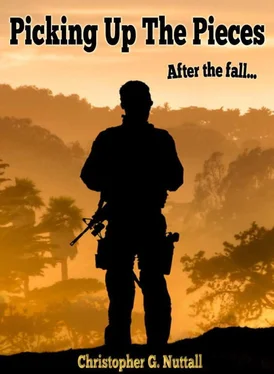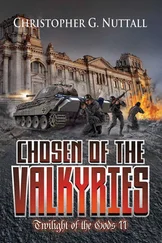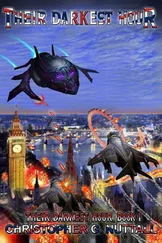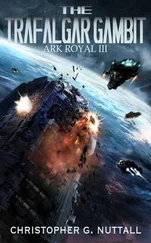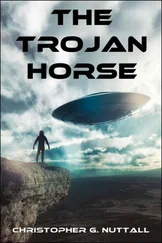I was met at the shuttlebay by a single officer, who escorted me through the ship’s corridors to Officer Country, and waved me into a single stateroom. I could have been convinced of the wastefulness of the battleships just by the Admiral’s stateroom — large enough to store extra missiles or emergency components — but my attention was distracted. It had been nearly two years since I last saw John Walker in the flesh.
“John,” I said, shaking his hand. “You’re looking well.”
“Liar,” John said. He still looked absurdly young for the Admiral’s uniform he wore — he couldn’t be older than thirty-five, if that — but he looked worn. “You still haven’t got rid of those scars, I see.”
“No, sir,” I said, taking the offered seat. It was easy to sit and banter with him, a distraction from the real purpose of the visit. “I feel that they add character to my face.”
“Someone lied to you,” John said, deadpan. “I read your reports — and Captain Price-Jones’ reports. You did very well down on Svergie. How long do you think it will last?”
I hesitated. I hated intelligence officers who made predictions — often just pulling the answers out of their behinds — but I understood why John was asking. If Svergie was reasonably stable, Fleet could encourage investment without fear of something blowing up in their face and forcing them to intervene openly.
“I think the new government will last until the elections in five years,” I said, finally. “The worst of the effort involved in creating the new farms will be over by then, so I suspect that the Progressives will probably find themselves weakened to the point where they have to adapt or be replaced by other parties — neither of which will threaten the planet’s new stability. Without us, the Svergie Army should still be able to handle any trouble that pops up now that the main body of the enemy force has been degraded and destroyed. After that…”
I shrugged. “It should hold together,” I concluded. “We broke the worst of their problems during the emergency situation.”
“Good enough,” John said. He looked relieved. “Not everyone on the Admiralty Board was happy with the concept of risking the Legion — or, rather, risking our activities being revealed — to try to save Svergie from itself. Now that it’s happened successfully, I think we can probably press for more interventions, while offering Svergie the trade credits it needs to make the jump to a space-based economy.”
“And ensure that it becomes a waypoint for the development of the sector,” I added. John didn’t bother to deny it. “Is it true that there will be nine more worlds founded in the next few years?”
“There are millions of people who want off Earth,” John confirmed. “There’s no way that they can all be housed in the solar system, even if the people who have already settled on Mars and Venus were willing to accept them — and they’re not. They made their feelings clear at the big conference on Unity last year. They will take some children, perhaps people with technical skills, but no one else.
“So we have to rush around trying to settle new colonies for them and force a lot of people who were basically just worthless parasites to actually become something useful. The shipping capability is stretched to breaking point even with the new starships coming off Heinlein’s production lines. If we can settle them and force them to work or starve, we will, but most of them would probably prefer to starve.”
I scowled. “I trust that you are not thinking of sending the Legion to Earth,” I said. “I wouldn’t go there on a bet.”
“I don’t think that the Legion could do anything even if you went,” John said. “Fleet Intelligence’s most optimistic projection is that half the population will die in the next few years. There’s a total biosphere collapse underway. We’re holding the orbital towers in hopes of keeping the gates open as long as we can, but God alone knows how many people are trapped down there without hope of anything, but death.”
“I’m surprised you’re even trying,” I said. If it was that hopeless, was John pouring Fleet resources down an endless hole? “I’m surprised that your fellows are allowing you to expend resources on saving them.”
John shrugged. “Earth still represents the largest human population in the Human Sphere,” he said, seriously. “If we can save as many as possible, we might be able to expand faster, maybe even get the Federation on its feet without another war.”
“Yeah,” I said. “How is the Federation coming along?”
“Slowly,” John admitted. “Half of them think that Fleet intends to become an Empire, the other half are out for what they can get for themselves and hang the rest. It’s total bloody chaos, not helped by the fact that there are people in Fleet who think that we should become an Empire, just to keep the children in line. If what you found implicates Heinlein… that demand is only going to grow stronger. Heinlein is definitely one of our problem children.”
He shook his head. “That doesn’t matter for the moment,” he said. “Take your time; rest, recover, and prepare for your next deployment. Svergie is hardly the worst world out there, Andrew, and they all need fixing.”
I smiled. “Just call us the fixers,” I said. “It makes a change from breaking things in the name of the UN.”
The End
Svergie was originally discovered in 2206 by a UN survey team. The planet was rapidly assessed as a 95% — i.e. close to Earth, but lacking some vital components, including edible fauna — and the UN declared the planet open for bids in 2208. A consortium headed by the King of Scandinavia (a neo-federation of Sweden, Norway and Denmark) purchased settlement rights from the UN and major settlement began two years later. After considerable haggling between the various elected representatives, the planet was officially named by the Swedes, but the various cities were actually named by the other nationalities. A site near the ocean was selected as the location of Landing City, which was renamed New Copenhagen after Svergie officially gained self-government.
Owing to its distance from Earth — the Jump Drive was less efficient at that point — Svergie’s growth was surprisingly slow. This was a result of several factors, including a general feeling that development should be centred on small farming communities, rather than larger cities and orbital stations. The transit station established in orbit around Svergie was allowed to decay after the early settlement had been completed and — eventually — was decommissioned. Although there was a steady flow of immigrants from Earth — conditions were worsening on the planet as the UN took control — the planet’s population barely rose above the 10 million mark. It was generally regarded as a backwater and the population accepted that. They had no desire for galactic power.
This tranquillity was brought to an abrupt end when the UN Survey Team discovered the presence of vital minerals in the mountains and insisted on sending in ‘inspectors’ to assess the possibility of a mining operation. Correctly suspecting that the UN intended to claim the resources for themselves, the Svergie Government created a Mining Department that would mine a limited amount of ore and sell it to the UN. This didn’t please the UN bureaucrats sent to oversee the planet and, eventually, Svergie formally became a UN protectorate. A hundred years of independence had come to an end.
Originally, the UN presence was not onerous and it took a long time for resistance to form. Had the UN concentrated only on mining and ignored the rest of the planet, it is quite likely that real trouble would have been avoided for a long time. The bureaucrats, however, had other ideas and after an attempt to restructure local law to make it more ‘equitable’ proceeded with their own plans. As Svergie produced little that could be exploited, the bureaucrats attempted to make new opportunities… and, eventually, realised that new colonists could be dumped on the planet. At first, this was restricted to political exiles from Pan-Europe, but later this came to include refugee women from Indonesia and their children, a group that was socially and culturally very different to the original settlers. Matters were not helped by rumours that the newcomers carried diseases, or radical fundamentalist religious beliefs — and they certainly were not helped by the UN’s plan to feed them all. The bureaucrats intended to use the original settlers to feed the newcomers, without insisting that the newcomers worked for a living.
Читать дальше
